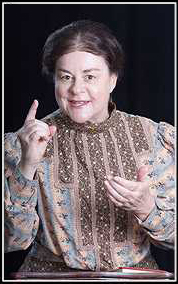
Angelina Grimke Weld, 1805-1879, lives again in the person of Susan Jones Mannino, dressed in the simple white collared, beige gown of her day. With a tea table to one side, she invites us back to the days just after the abolition of slavery in Charleston. In animated fashion in Angelina, she tells us in soft Southern tones how she championed the rights of slaves and the education of women. Nothing soft about that story!
Angelina’s Charleston relatives didn’t understand the Abolitionist Movement, and so she didn’t fit in. She couldn’t be her serious self around eligible men. Her “way out” was religion. Angelina’s oldest sister Sarah was a Quaker, and Angelina was able to join her in Boston. As a Quaker, she could--and here Mannino demonstrates at a central podium--preach. As a teacher in a Presbyterian Sunday School (at least for a while), she taught children that cruelty to slaves was wrong.
On a bench to the side farthest from the tea table, Mannino’s Angelina can consult and read from her diaries of her experiences at a slave house. She gives a vivid account of a particular instance of extreme cruelty to one from her home. She shows us a letter to women that was published. That it sought their help in changing slavery laws did not make her popular back in Charleston. Though being in the north and with Quakers protected her, Quaker life also cut her off from the mainstream.
When Angelina met Theodore Welk at Abolitionist meetings, he impressed her with his speaking ability and his belief in equality for women. In February 1838, she, herself, addressed the Boston legislature. We see her pride in being the first woman doing so. Though she worried about whether to marry, fearing absorption in the role of mother, she actually became a well-known speaker. Having a family meant she could also open a school! Mannino cites Angelina Grimke Weld’s continual publications, especially “Slavery As it Is,” written with Susan. Reading a letter from an emancipated black man who, ironically, reveals himself to be a nephew, caps Mannino’s publication and well-directed performance of a historical figure who certainly merits our attention.
